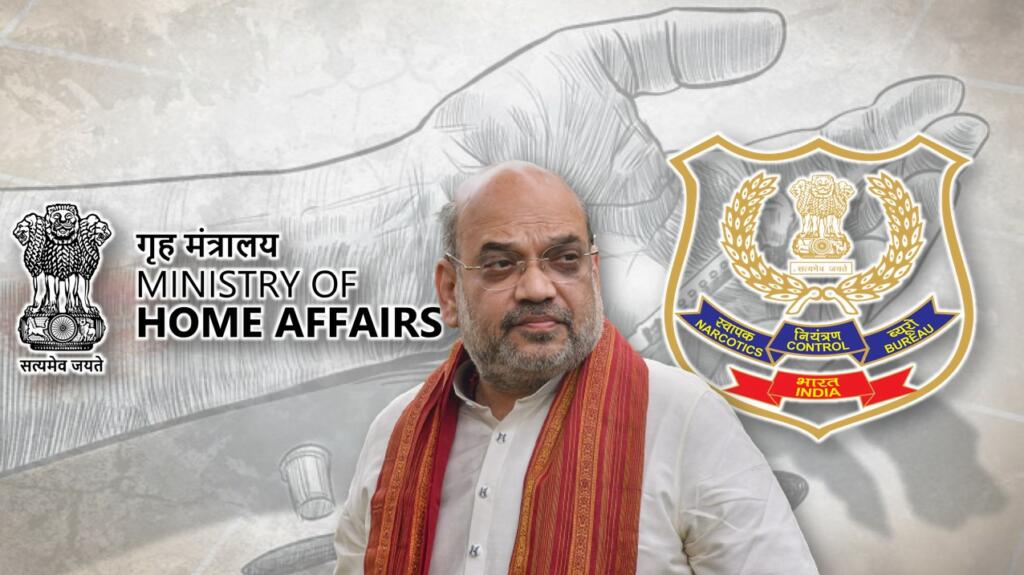War is more often implied with the physical confrontation of two or more armies for the interest of their people or nation. But when people are internally bleeding to a slow death by some external or internal enemies, the purpose of having a strong line of physical defence is destroyed. Similarly, India encircled by unstable, hostile & unfriendly countries is at the centre of the world’s two biggest hotspots of drugs, the ‘Golden Triangle’ & the ‘Golden Crescent’ & they are internally bleeding the country with the help of organized crime and drug syndicates.
Creation of an army to fight this invisible war
In its fight to eliminate the international drug syndicates operating in India, the Home Ministry has announced the creation of 1800 posts in the NCB (Narcotics Control Bureau). It becomes significant because till now the bureau was working with a strength of 1100 & recently the agency sought clearance from the ministry for the creation of 3000 vacancies at various levels.
The exponential rise in the posts is the reflection of the constant threat posed by the syndicate of organized crime. It is in consonance with an internal clearance drive launched by the Home Ministry to break the backbone of these transnational illegal activities.
Also Read: India has an effective solution for the “Chicken’s Neck” problem
Drugs & Terrorism – Finance & War
Every war requires finance to sustain itself. Enemies of the state realise this. To sustain their war against the nation, they need access to a strong financial support system. It was the basic economy of demand and supply that culminated in the formation of a ‘Golden Crescent. Terror organisations have actively used drug money to sustain their war against India.
The hostilities of Pakistan toward India mechanize the simultaneous growth of drug trafficking & extremist activities in the region. The two border states of India, Kashmir & Punjab were at the receiving end of frequent terrorism & drug infiltration. International syndicates operating along the north-western border use border routes of Gujarat, Rajasthan, Punjab and Jammu & Kashmir. Although this is the most guarded border, varied geographical & climatic conditions make it porous. Further, the large Arabian Sea is the other route used by these traffickers. The main distribution points of the region are Mumbai, Goa & Mundra coastal ports.
Read More: As predicted by TFI, Pakistan’s own Frankenstein monster is out to destroy it
It was the organized crime of drugs, terrorism, prostitution & money laundering which promoted the Gang war & Terrorism in the financial city of Mumbai. Using the ladder of organized crime, terrorists like Dawood Ibrahim made their way to the dark syndicate of terrorism financing through drug trafficking.
Drugs & Insurgency in Northeastern states of India
The north-eastern states of India are at the border of the Golden Triangle of drugs & opium trafficking. It is constituted by countries combining Thailand, Laos, Vietnam, and bordering Myanmar. Although most of the drugs produced in these countries are exported to the south-east Asian countries, the militant groups in the north-eastern states taking the benefit of geography, politics, and climatic conditions produce the drugs at a mass level and sustain their ‘war’.
Read More: Punjab had a drugs problem. Then came AAP, now it has a debt problem too
Although the eastern neighbours of India somewhat provide great support to eliminate the menace of drug trafficking, a major concern for the Indian state is the hostile western neighbour.
Pakistan is not only exporting the terrorism to India but providing a safe harbour to such terrorists & international syndicates to locally produce & export the drugs & opium to India.
To break this transnational syndicate of drugs, India needs to provide strong enforcement of the law with a strong intelligence base structure. It becomes very imperative for India to make a net of information & intelligence sharing with friendly countries & strike a coordinated attack on such organized crime. The government’s recent action & approval to significantly increase the number of posts will provide the required manpower to fight the internal war imposed on the youth of the country.
